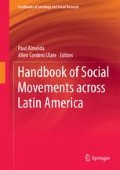Abstract
This chapter will look at social movement organized in the barrios of Caracas, Venezuela. The history of popular organization in the barrios has been an interplay of independent action and linkages with the state, and the fashioning of creative strategies inside, outside, and against the political system. Urban social movements in Caracas are extraordinarily variegated and heterogeneous. There are militant cadre-based groupings that have roots in the guerrilla struggles of the 1960s, as well as collectives that operate through assemblies and mass actions, and cultural groupings based in music, song, and dance. I distinguish urban social movements from political parties and trade unions by their basis in the networks of everyday life, their location in the space of the barrio rather than the party office or union hall, and their attempts to establish independent linkages with the state. While trade unions tend to engage in concerns that are more narrowly economic—such as wages, length of the work week, and benefits—urban social movements see economic inequality as one dimension of the experience of marginality and have tended to couch their actions in cultural-symbolic terms.
Access this chapter
Tax calculation will be finalised at checkout
Purchases are for personal use only
Notes
- 1.
New social movement theorists go beyond a reductionist concept of politics and political culture as found in mainstream sociology and some resource mobilization theory to assess the multiple realms in which dominance is contested (Alvarez, Dagnino, and Escobar, “Introduction,” 11). Although some scholarship on resource mobilization theory, such as Sidney Tarrow’s “collective action frames” and Debra Friedman and Doug McAdam’s “identity incentives,” are concerned with theorizing cultural processes, others have been mostly concerned with institutional and structural processes, and how movement demands are processed in institutional spheres (Alvarez, Dagnino, and Escobar, “Introduction”). Also, while resource mobilization theorists often assume the existence of collective identities, proponents of new social movements theory are interested in the construction and negotiation of identities.
- 2.
Interview with Luisa Alvarez, popular historian, San Agustín, May 2004.
- 3.
Interview with Héctor Ramírez, political activist, La Vega, January 2004.
- 4.
Ellner, “Obstacles to the Consolidation of the Venezuelan Neighborhood Movement,” 78.
- 5.
López Maya, Smilde, and Stephany, Protesta y Cultura en Venezuela, 63.
- 6.
Ellner, “Obstacles to the Consolidation of the Venezuelan Neighborhood Movement,” 78–82.
- 7.
Holston, Insurgent Citizenship, see Chapter 7.
- 8.
Velasco, “We Are Still Rebels.”
- 9.
All interviews were conducted and observations made by the author during 10 months of field research conducted in Caracas between January 2004 and January 2007.
- 10.
Notably, this is a mostly Caracas phenomenon, as outside of Caracas, there are radio stations which are led by women.
- 11.
Squalid ones, Chávez’s term for opposition supporters.
References
Alvarez, S., Dagnino, E., & Escobar, A. (1998). Introduction: The cultural and the political in latin American social movements. In S. Alvarez, E. Dagnino, & A. Escobar (Eds.), Cultures of politics/politics of cultures: Re-visioning Latin American social movements (pp. 1–32). Colorado: Westview Press.
Buxton, J. (2003). Economic policy and the rise of Hugo Chávez. In S. Ellner & D. Hellinger (Eds.), Venezuelan politics in the Chávez Era: Class, polarization, and conflict (pp. 113–30). Boulder: Lynne Rienner Publishers.
Contreras, J. (2000). La Coordinadora Cultural Simón Bolívar: Una Experiencia de Construcción del Poder Local en la Parroquia ‘23 de Enero’. BA Thesis, Escuela del Trabajo Social, Universidad Central de Venezuela, 54–6.
Coronil, F. (1997). The magical state: Nature, money, and modernity in Venezuela (p. 141). Chicago: University of Chicago Press.
Davis, M. (2006). Planet of slums (p. 178). London: Verso.
Ellner, S. (1999). Obstacles to the consolidation of the Venezuelan neighborhood movement: National and Local Cleavages. Journal of Latin American Studies, 31, 75–97.
Escobar, A. (2001). Place, Economy, and Culture in a Post-Development Era. In R. Prazniak & A. Dirlik (Eds.), Places and politics in a Age of Globalization (pp. 193–217). Boulder: Rowman and Littlefield Publishers.
Grohmann, M. (1996). Macarao y Su Gente: Movimiento Popular y Autogestión en los Barrios de Caracas (p. 41). Caracas: Nueva Sociedad.
Holston, J. (2008). Insurgent citizenship: Disjunctions of democracy and modernity in Brazil. Oxford: Princeton University Press.
López Maya, M., Smilde, D., & Stephany, K. (1999). Protesta y Cultura en Venezuela: Los Marcos de Acción Colectiva en 1999. Caracas: CENDES
Olivera, O. (2004). ¡Cochabamba! Water War in Bolivia (p. 130). Cambridge: South End Press.
Rollón, R., & Luisa, M. (1995). De las Protestas a Las Propuestas: Identidad, Acción y Relevancia Política del Movimiento Vecinal en Venezuela (p. 97). Caracas: Instituto de Estudios de Iberoamérica y Portugal.
Sassen, S. (1998). Whose city is it? Globalization and the formation of new claims. In S. Sassen (Ed.), Globalization and its discontents. New York: The New Press.
Smith, N., & Low, S. (2006). Introduction: The imperative of public space. In S. Low & N. Smith (Eds.), The politics of public space (pp. 1–16). London: Routledge.
Stephen, L. (1997). Women and social movements in Latin America: Power from below. Austin: University of Texas Press.
Velasco, A. (2011). We are still rebels: The challenge of popular history in Bolviarian Venezuela. In D. Smilde & D. C. Hellinger (Eds.), Venezuela’s Bolivarian democracy: Participation, Politics and Culture under Chávez (pp. 157–185) Duke University Press.
Author information
Authors and Affiliations
Corresponding author
Editor information
Editors and Affiliations
Rights and permissions
Copyright information
© 2015 Springer Science+Business Media Dordrecht
About this chapter
Cite this chapter
Fernandes, S. (2015). Urban Social Movements in Venezuela. In: Almeida, P., Cordero Ulate, A. (eds) Handbook of Social Movements across Latin America. Handbooks of Sociology and Social Research. Springer, Dordrecht. https://doi.org/10.1007/978-94-017-9912-6_14
Download citation
DOI: https://doi.org/10.1007/978-94-017-9912-6_14
Published:
Publisher Name: Springer, Dordrecht
Print ISBN: 978-94-017-9911-9
Online ISBN: 978-94-017-9912-6
eBook Packages: Humanities, Social Sciences and LawSocial Sciences (R0)

